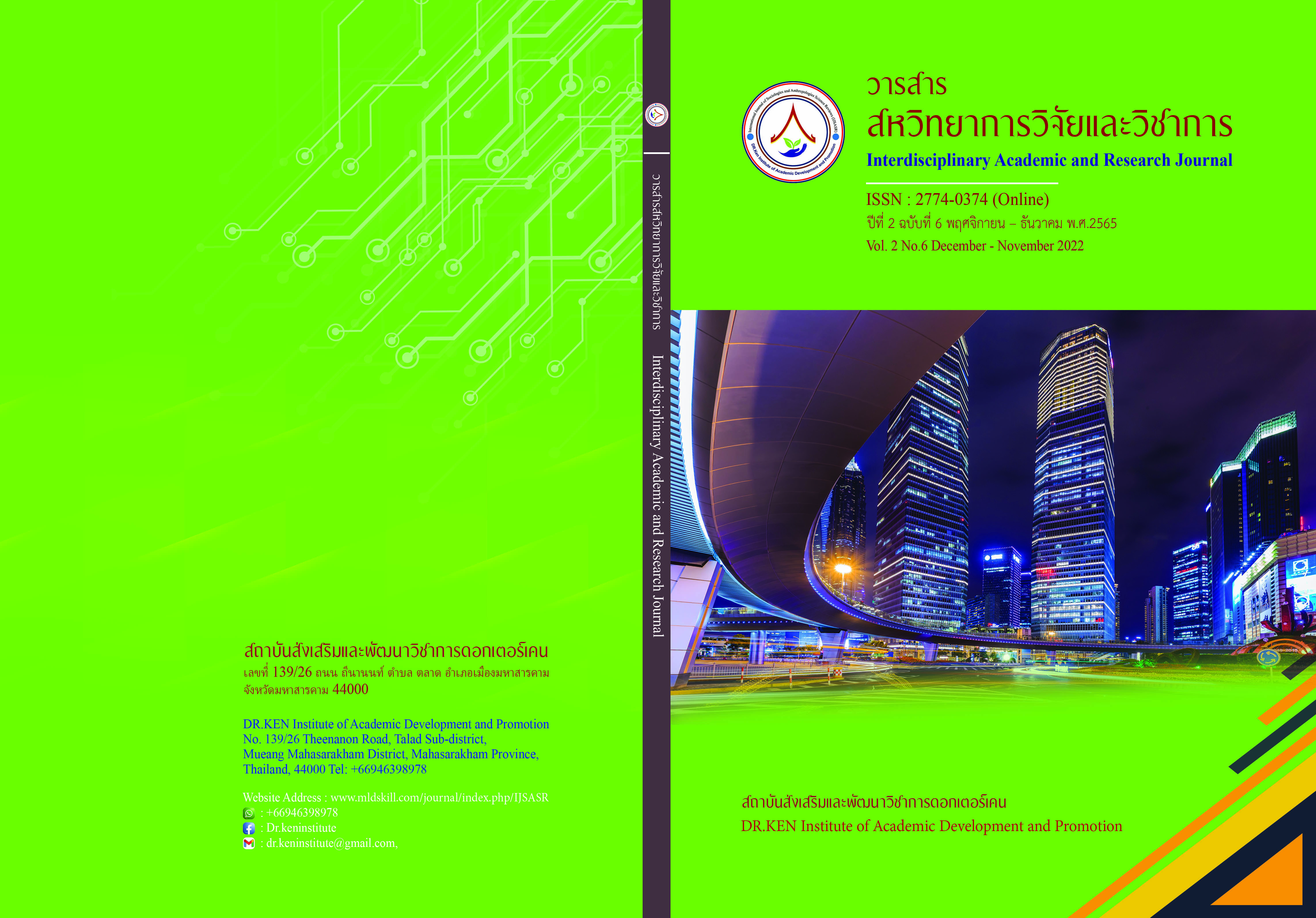The Challenges of Leadership in Disaster Management of the Local Government Organizations: A Case Study of Flooding
DOI:
https://doi.org/10.14456/iarj.2022.143Keywords:
Leader Challenges; , Natural Disaster Management; , Flood Management; , Local Administration OrganizationAbstract
Integrated management concept by applying various theoretical concepts to disaster management, and can adjust the guidelines for disaster work to adapt to changes with global trends and disasters that are becoming more and more severe day by day. It can be seen that the current disaster management should change from the old practice to change for better management by using technology to take part in the management. Thus, the purposes of the current study were to study procedures in managing natural disasters of local administration organizations using flood management as a case study and to introduce a guideline as a recommended solution to the problems. The empirical evidence from the past to the present was analyzed and synthesized. The results of the study were as follows. (1) In terms of managing floods, there should be an approach strategy that can be applied in urgent situations. Two natural disaster management plans are used by local administration organizations. (1.1) In the pre-disaster stage, there must be the participation of both government and private sectors. This could be exemplified by developing a specific flood management strategy, adjusting the procedure with the participation of the community, and providing rapid help. (1.2) In the flooding stage, it is obligated to fix and control the fluctuation which is a result of technology, limited resource, social problems and expanded urban areas, and occupation and labor. These challenges are risks leaders need to control. The plan needs to be continuously followed. (2) in terms of the recommendations, a natural disaster alert plan and natural disaster management training should be integrated. The plan includes 3 stages of 4F-3F-4F taking data from the study to plan the working processes, improve communication, and evaluate the results, and provide a long-term solution. Stakeholders are encouraged to participate and share their ideas to systematically avoid the impact and damage of natural disasters.
References
กรมป้องกันและบรรเทาสาธารณภัย. (2557). การลดความเสี่ยงจากภัยพิบัติสู่การพัฒนาที่ยั่งยืน. กรุงเทพฯ : กรมป้องกันและบรรเทาสาธารณภัย.
กรมป้องกันและบรรเทาสาธารณภัย. (2559). หนังสือคำศัพท์ด้านการบริหารจัดการความเสี่ยงจากภัยพิบัติ. (พิมพ์ครั้งที่ 2). กรุงเทพฯ : กรมป้องกันและบรรเทาสาธารณภัย.
กฤชวรรธน์ โล่วัชรินทร์. (2564). รัฐประศาสนศาสตร์ แนวคิดเพื่อการจัดการปกครองสาธารณะในศตวรรษที่ 21. ขอนแก่น : วิทยาลัยการปกครองท้องถิ่น มหาวิทยาลัยขอนแก่น.
คณะกรรมการป้องกันและบรรเทาสาธารณภัยแห่งชาติ. (2565). แผนการป้องกันและบรรเทาสาธารณภัยแห่งชาติ พ.ศ. 2564 – 2570. [Online] https://dmcrth.dmcr.go.th/attachment/dw/download.php?WP=nKq4MUNjoGy3ZHkCoMOahKGtnJg4WaN4oGA3A0j1oH9axUF5nrO4MNo7o3Qo7o3Q
ไชยนันท์ ปัญญาศิริ. (2563). แนวคิดร่วมสมัยทางการจัดการสาธารณะ : การวิเคราะห์เชิงเปรียบเทียบและการประยุกต์ใช้. (พิมพ์ครั้งที่ 2). กรุงเทพฯ : ธรรมนิติ เพรส.
ณฐภัทร อินทรปรีดา,ประสาร มาลากุล ณ อยุธยา และผ่องพรรณ เกิดพิทักษ์. (2565). ภาวะผู้น าการปรับเปลี่ยนเพื่อเสริมสร้างการบริหารจัดการงานในโลกแห่งความผันผวน. Ratchaphruek Journal. 20 (2), 16-28. DOI: 10.14456/rpjnrru.2022.2
ทศพล อัครพงษ์ ไพบูลย์, เพ็ญศรี ฉิรินัง, อรุณ รักธรรม, และสมพรเฟื่อง จันทร์. (2563). การบูรณาการการจัดการภัยพิบัติในยุค 4.0. วารสาร นวัตกรรมการบริหารและการจัดการ, 8(3), 14-23.
ปัณณพงศ์ วงศ์ณาศรี. (2017). วิเคราะห์บริบทความท้าทายขององค์กรปกครองส่วนท้องถิ่นในการบริหาร ท้องถิ่นเพื่อขับเคลื่อนนวัตกรรมท้องถิ่นในยุคไทยแลนด์ 4.0. Asian Journal of Arts and Culture, 17(1), 63-78.
สกาวเดือน พิมพิศาล และอนุชา ลาวงค์. (2558). การวางแผนกลยุทธ์และการบริหารโครงการบนพื้นฐานหลักธรรมาภิบาล. วารสารวิทยาลัยนครราชสีมา, 9(1), 83-92.
สถาบันพระปกเกล้า. (2563). การประหยัดจากขนาดในองค์กรปกครองส่วนท้องถิ่นและวิเคราะห์ศักยภาพการควบรวมท้องถิ่นขนาดเล็ก : รายงานวิจัยฉบับสมบูรณ์โครงการวิจัยเรื่อง. กรุงเทพฯ : สถาบันพระปกเกล้า.
สำนักงานกองทุนสนับสนุนการสร้างเสริมสุขภาพ. (2565). รายงานสถานการณ์ความปลอดภัยทางถนนประเทศไทย ปี พ.ศ.2563. ขอนแก่น : สำนักงานกองทุนสนับสนุนการสร้างเสริมสุขภาพ.
Uchiyama, C., Linda Anne, S., & Tandoko, E. (2020). Climate Change Research in Asia: A knowledge synthesis of Asia-Pacific Network for Global Change Research (2013-2018). Environmental Research, 188(2),109635, DOI: 10.1016/j.envres.2020.109635
Northouse, P. G. (2016). Adaptive Leadership in Leadership: Theory and Practice. 7th edition. California: SAGE Publication.
Parween, S. & Deepak, S. (2019). Positioning the future of Human Resource Management in a VUCA World. [Online] https://www.researchgate.net/publication/333673492.
Prakongsri, P., & Santiboon, T. (2020). Effective Water Resources Management for Communities in the Chi River Basin in Thailand. Environmental Claims Journal, 32(4), 323-348.
United Nations Office for Disaster Risk Reduction. (2019). Global Assessment Report on Disaster Risk Reduction. Geneva: UNDRR.
Downloads
Published
How to Cite
Issue
Section
License
Copyright (c) 2022 อนุชา ลาวงค์, วาริธ ราศรี, นุจรี ใจประนบ, บัญชา พุฒิวนากุล

This work is licensed under a Creative Commons Attribution-NonCommercial-NoDerivatives 4.0 International License.
Copyright on any article in the Interdisciplinary Academic and Research Journal is retained by the author(s) under the under the Creative Commons Attribution-NonCommercial-NoDerivatives 4.0 International License. Permission to use text, content, images, etc. of publication. Any user to read, download, copy, distribute, print, search, or link to the full texts of articles, crawl them for indexing, pass them as data to software, or use them for any other lawful purpose. But do not use it for commercial use or with the intent to benefit any business.
















.png)


